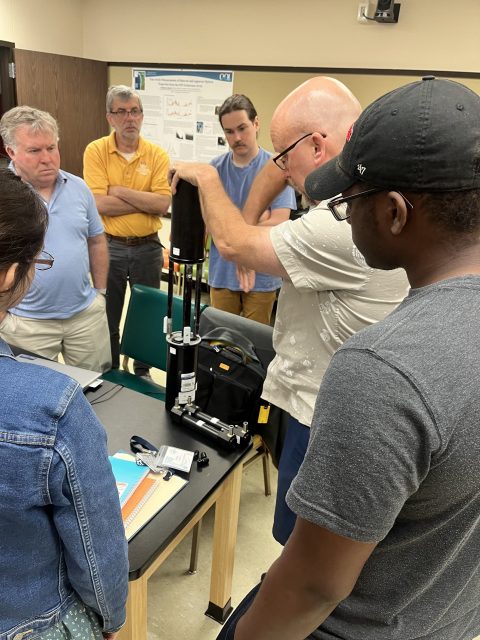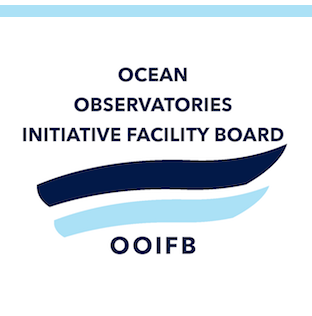Posts Tagged ‘AC-S’
Sensor Summer School Curriculum and Video Available
The Ocean Observatories Initiative Facility Board (OOIFB) hosted a 2023 summer school (July 17-21, 2023) at Oregon State University in Corvallis, Oregon that focused on OOI optical attenuation and absorption data. A mix of advanced graduate students, post-doctoral fellows, and early career scientists participated in this hands-on learning experience about how to access, analyze, and interpret data from the Sea-Bird AC-S. Data from the AC-S is used to characterize the absorption and scattering of light in seawater, which provides information on phytoplankton biomass in the measured ocean region.
So others may benefit from what was learned, the curriculum is available online here.
Read More
OOIFB Bio-Optics Sensor Summer School Happening Now
The OOIFB is hosting a 2023 summer school this week (July 17-21, 2023) at Oregon State University (OSU) in Corvallis focusing on OOI optical attenuation and absorption data. A mix of advanced graduate students, post-doctoral fellows, and early career scientists have traveled to Oregon to participate in a hands-on learning experience about how to access, analyze, and interpret data from the Sea-Bird AC-S. Data from the AC-S is used to characterize the absorption and scattering of light in seawater, which provides information on phytoplankton biomass in the measured ocean region.
The workshop’s daily agenda is jam packed. OSU Associate Professor and AC-S expert Andrew Barnard is leading the lecture portion of the workshop to ensure participants have a clear understanding of what the AC-S measures, how the instrument works, and how to interpret the collected data. Coastal Endurance Principal Investigator Ed Dever, who was instrumental in organizing the workshop, will also present an introduction to AC-S and related OOI measurements.
Each day participants are assigned data-related homework, so they can learn data analysis skills with the help of OOI data experts. OOI data experts Chris Wingard of the Coastal Endurance team and Wendi Ruef of the Regional Cabled Array are on hand all week to help participants work with the data. Data expert Jennifer Batryn of the Coastal and Global Scale Nodes Team will be lending a hand virtually.
OOI uses the Sea-Bird AC-S as its spectrophotometer, referring to it as “OPTAA: optical attenuation and absorbance instrument.” The optical attenuation and absorption data provides information on the relative biomass of different phytoplankton size classes and phytoplankton functional types, estimates of biogeochemical proxies, and may be used to validate remote sensing measurements. AC-S sensors are deployed on most of the OOI platforms, including coastal, cabled, and high latitude moorings and are a significant proportion of the overall sensors deployed.
Kendra Daly, OOIFB chair, who proposed the idea and helped execute the workshop said, “We thought what a great opportunity to gather OOI data experts, put them in the same room for a week with those wanting to use these data in their research, and watch the synergy happen! The experience is sure to have a multiplier effect. OOI data experts will benefit from the data users’ experience, while the data users will end up being OOI data experts themselves.”
To maximize the usefulness of the workshop, the workshop curriculum was made available online.
Read More
Bio-Optics Sensor Summer School Applications Open
Are you interested in using OOI’s optical attenuation and absorption data in your research? Have you ever faced challenges finding and interpreting this type of data? If so, we hope you will consider applying for the 2023 OOI Bio-Optics Sensor Summer School.
The Ocean Observatories Initiative Facility Board (OOIFB) will host the summer school on July 17-21, 2023 on the campus of Oregon State University in Corvallis, OR. The course will focus on learning how to analyze and interpret the Sea-Bird AC-S measurements of optical attenuation and absorption. The AC-S is a hyperspectral instrument used to characterize the way seawater absorbs and scatters light and total scattering can be derived for living and detrital particles in the ocean. The OOI Program deploys the Sea-Bird AC-S on most of the OOI platforms, including coastal, cabled, and high latitude moorings.
Marine phytoplankton play an important role in ocean ecology and global biogeochemical cycles. The optical attenuation and absorption data from the AC-S provides information on the relative biomass of different phytoplankton size classes and phytoplankton functional types. In addition, other biogeochemical proxies, such as particulate organic carbon, may be estimated. The AC-S data also may be used to validate remote sensing measurements. These observations will be useful in addressing science questions covered by several OOI research themes including:
- Climate Variability, Ocean Circulation, and Ecosystems.
- Coastal Ocean Dynamics and Ecosystems.
- Turbulent Mixing and Biophysical Interactions.
About 25 advanced graduate students, post-doctoral fellows, and early career scientists will be selected as participants for the summer school. Other career level researchers will be considered, based on space availability. Participants should have a general understanding of oceanography/biology. Only applicants from U.S institutions can be considered. Participation will be in-person only and all selected students must be available to attend all days of the course. Funding for reimbursement of travel expenses, accommodations, and meals is offered.
Additional details about the summer school program, as well as a link to the application form are available here.
Please submit your application by the end of the day on February 28, 2023. Selections and notifications will be made in March. The selection process will strive to maximize diversity of the summer school program with regard to race and ethnicity, gender, ability, sexual orientation, geography, and research experience.



